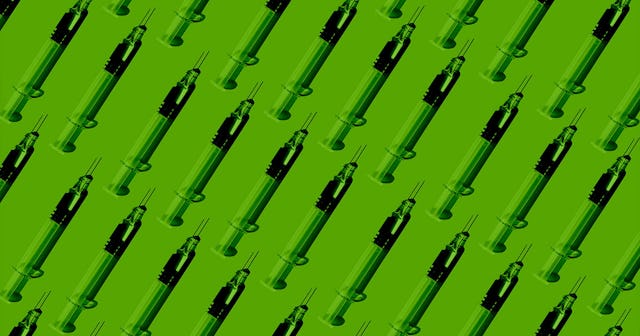Op-Ed: The Government Should Pay People To Get The COVID Vaccine

The other day I was at the Taco Bell drive-through, chatting with the assistant manager. I live in a pretty small town, so I’ve gotten to know this guy a little bit just from pre-COVID social events. I was asked how things were going, and during the course of the conversation, I asked if he’d heard when he would be eligible to get the vaccine since he’s a frontline worker. He paused, put his hands up and said, “I’m not getting it. I don’t think it’s safe. I’m just going to take my chances.” And sadly, I’ve heard this from a lot of friends and family. There is a general skepticism about the vaccine.
We spoke for a moment more and then, thinking about an article I read by economist Robert Litan, I casually said, “What if they paid you to get it?”
“Like the government?” he said.
“Yeah,” I said.
He thought for a moment, and said, “Maybe.”
I couldn’t help but realize that even without discussing the amount, at just the mention of paying this man to take the vaccine, he went from a hard “no” to a “maybe.” And Litan, an affiliate of the Brookings Institution, says that paying people to take the vaccine might just be the magic bullet to getting America vaccinated.
Here’s how it would work. According to Litan, everyone would get $200 after getting both vaccine injections. Then, once our country reaches herd immunity, everyone will get $800 — bringing the grand payment to all vaccinated Americans to $1000.
This is a pretty cookie-cutter economic strategy. And chances are you’ve already seen it in practice. Take my health insurance, for example: I can get a discount if I have a gym membership, and a few years ago, my insurance company gave people an actual payout if they quit smoking. You probably get a discount on your car insurance for having a safe driving record. And we’ve all seen the apps that promise a payout once we reach certain health goals.
The part that really sticks out to me is the $800 payment once people meet herd immunity, because I would assume that would cause others to say, “Get your shots, man. I want to get paid.” And hopefully that would mean they are sharing peer-reviewed, current science with their peers touting the safety and efficacy of the COVID vaccines.
Paying people to do things tends to work, and we definitely all need to get vaccinated. But sadly, the numbers are not adding up. According to the good doctor Anthony Fauci, as quoted in Newsweek, “around 70 to 85 percent of Americans will need to be vaccinated against COVID-19 to see a ‘dramatic decrease’ in cases and reach herd immunity… That 70 to 85 percent level of vaccination equates to around 230 million to 279 million of the total U.S. population of 328,239,523 people.”
The pinch is, just like my local acquaintance mentioned above, 30% of Americans say they either will not get vaccinated, or probably won’t get vaccinated. Of course, their reasons are varied — everything from people who are against vaccinations in general, to people who are unsure of the new vaccines’ safety.
colecom/Getty
If you look at the hard reality above, getting everyone on board with vaccinations is probably going to take a serious public health campaign, mandatory vaccinations, or incentives. Just to be clear, states do have the right to mandate vaccinations. According to a recent NPR article on the subject, “Legal precedent establishing the rights of states to mandate vaccination has been in place since 1905. In a case involving smallpox vaccinations, the Supreme Court ruled that states had the authority to mandate vaccinations under their police powers to protect public health and safety.”
But dang people, let’s really think about that. Many states have had a hard enough time mandating something as simple as wearing a mask in public. I can only imagine how hard it would be to mandate vaccinations, and the conspiracy theories that would rise up in the dark part of the internet in the wake of such an endeavor. Not to mention, potentially violent uprisings like we recently saw at our nation’s Capitol.
But if we could use a carrot instead of a stick, and give people an enticing incentive to get vaccinated, this all might go a lot smoother. I could sure use an extra thousand bucks.
There is a downside to paying people to vaccinate, of course. Cynthia Cryder, an associate professor of marketing at Washington University’s Olin Business School, had this to say to NPR about the downsides of a vaccine payment: “Payments may indeed encourage some people to get the vaccine. But it may also deter people from getting the vaccine. Because payments signal that the vaccine is risky.” No system is perfect, and these points are valid and worth considering.
And I know what you are thinking: how much would something like this cost? According to Robert Litan, the architect of the idea, “between $250 billion and $300 billion.” His argument for the large sticker price is this: “It would be a drop in the bucket compared to the economic harm if the pandemic persists.” He views this, more or less, as the price of having a divided country where people do not trust science.
Now of course, you should get the vaccine because you care about the common good, and health of the people around you. But unfortunately, that’s not how America works right now, and well… that’s just sad, and a topic for another article. And no, there is no bill currently on the table to start an incentive program for vaccinations.
But after looking at the numbers, I think it’s a great idea — and we shouldn’t be surprised if we hear more on the subject in the coming months.
This article was originally published on